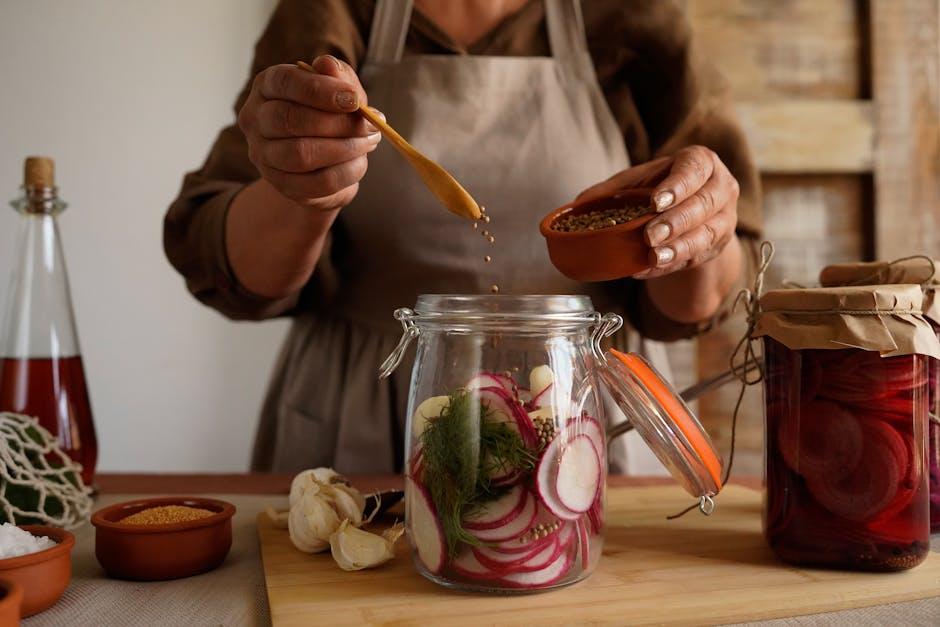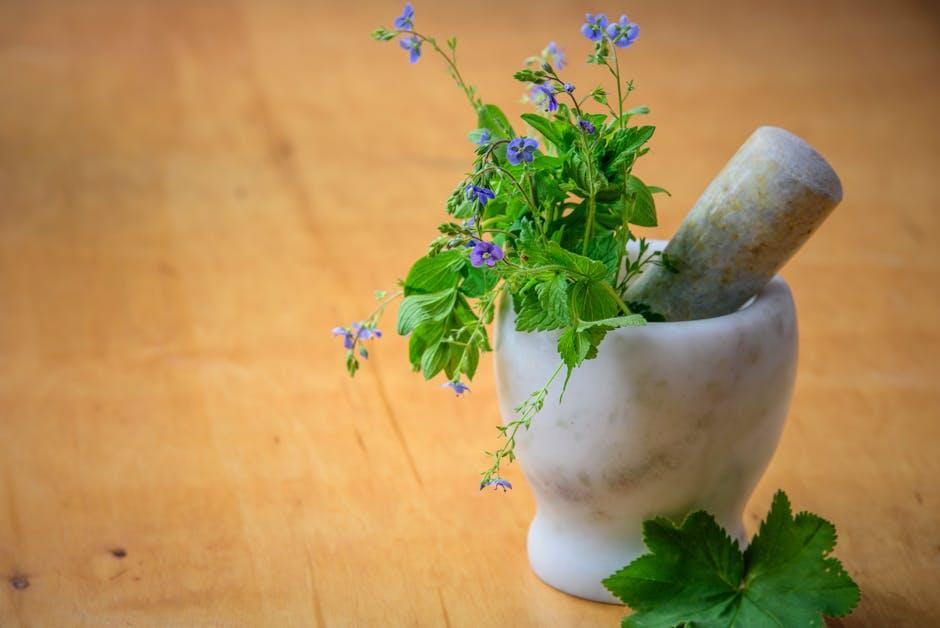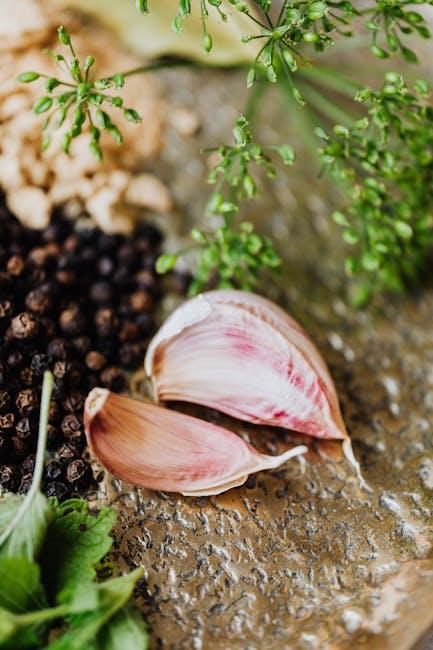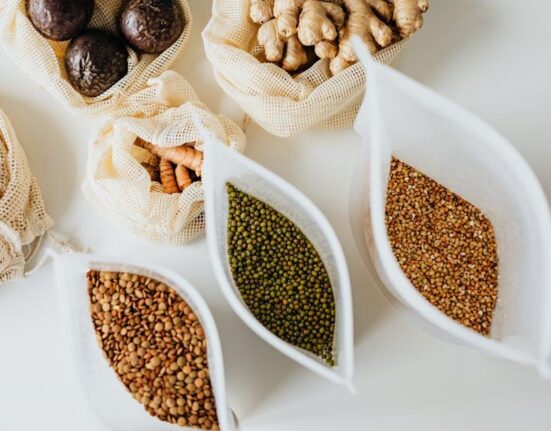In the intricate world of digestive health, nature offers a quiet yet powerful remedy—herbs and spices that not only tantalize our taste buds but also nurture our gut. These botanical wonders have been trusted for centuries, weaving their way through cultural traditions and modern wellness alike. From soothing inflammation to promoting balanced digestion, gut-friendly herbs and spices hold the key to a harmonious digestive system. In this article, we explore the subtle magic behind these natural ingredients and how they can become a gentle support on your journey to better gut health.
Table of Contents
- Understanding the Role of Herbs and Spices in Digestive Health
- Top Gut-Friendly Herbs to Incorporate into Your Daily Diet
- Spices That Soothe Inflammation and Support Gut Healing
- How to Use Herbs and Spices for Better Digestion and Comfort
- Combining Flavors and Health Benefits: Recipes for a Happy Gut
- Q&A
- Wrapping Up

Understanding the Role of Herbs and Spices in Digestive Health
Herbs and spices are more than just flavor enhancers; they play a dynamic role in promoting digestive well-being. Many possess compounds that stimulate the production of digestive enzymes, which facilitate the efficient breakdown of food and nutrient absorption. For instance, ginger contains gingerol, known for its anti-inflammatory properties and ability to soothe the gastrointestinal tract, reducing nausea and bloating. Similarly, peppermint, with its natural menthol, helps relax the muscles of the digestive tract, calming cramps and easing discomfort.
Incorporating these natural allies into your diet can create a balanced digestive environment, enhancing gut motility and supporting microbial health. Some of the key herbs and spices to consider include:
- Fennel: Relieves gas and reduces bloating with its antispasmodic qualities.
- Turmeric: Offers anti-inflammatory benefits that soothe digestive inflammation.
- Cumin: Encourages bile production which aids fat digestion.
- Cardamom: Improves digestion and fights acidity.
| Herb/Spice | Primary Benefit | Digestive Effect |
|---|---|---|
| Ginger | Anti-inflammatory | Reduces nausea, stimulates digestion |
| Fennel | Antispasmodic | Alleviates gas and bloating |
| Turmeric | Anti-inflammatory | Supports gut lining health |
| Peppermint | Muscle relaxant | Eases intestinal cramps |

Top Gut-Friendly Herbs to Incorporate into Your Daily Diet
Integrating herbs such as ginger, peppermint, and turmeric into your meals can work wonders for your digestive health. These natural powerhouses are known to calm inflammation, soothe the stomach lining, and promote smooth digestion. For instance, ginger stimulates digestive enzymes and reduces nausea, while peppermint relaxes the gastrointestinal muscles, easing symptoms of bloating and indigestion. Turmeric, rich in curcumin, acts as a potent anti-inflammatory agent, helping to balance gut flora and support overall gut integrity.
Incorporating these herbs daily is easier than you might think. Sprinkle fresh or dried mint leaves into your morning tea, add grated ginger to smoothies or stir-fries, and incorporate turmeric into soups, rice dishes, or golden milk. Below is a quick guide showcasing the key benefits and popular uses of some top gut-friendly herbs:
| Herb | Main Benefit | Suggested Use |
|---|---|---|
| Ginger | Reduces nausea & aids digestion | Tea, smoothies, stir-fries |
| Peppermint | Relaxes gut muscles & relieves bloating | Tea, salads, garnishes |
| Turmeric | Anti-inflammatory & supports gut lining | Soups, golden milk, rice |
| Fennel | Reduces gas and improves digestion | Seeds, infusions, seasoning |
| Chamomile | Calms the digestive tract | Tea, infusions, tinctures |

Spices That Soothe Inflammation and Support Gut Healing
Your digestive system thrives when nurtured with nature’s own remedies. Certain spices are renowned for their anti-inflammatory properties that can calm an irritated gut lining and enhance healing. Turmeric, with its active compound curcumin, acts as a powerful antioxidant that reduces swelling and supports tissue repair. Similarly, ginger works to ease digestive discomfort by soothing the stomach and boosting circulation, which is essential for the restoration of gut cells.
Incorporating these spices into your daily routine is simple and beneficial. Consider adding:
- Fennel seeds: Known for relieving bloating and gas.
- Cinnamon: Helps regulate blood sugar and fight inflammation.
- Cloves: Contain eugenol, a compound that promotes gut lining health.
| Spice | Key Benefit | How to Use |
|---|---|---|
| Turmeric | Reduces inflammation | Add to soups, smoothies, or teas |
| Ginger | Alleviates nausea and aids digestion | Fresh slices in hot water or grated in meals |
| Fennel | Relieves bloating | Chew seeds post-meal or brew as tea |

How to Use Herbs and Spices for Better Digestion and Comfort
Incorporating herbs and spices into your daily meals is a flavorful strategy to promote digestive health. Ginger, known for its warming properties, can be brewed as a tea or added fresh to soups and stir-fries to help soothe nausea and stimulate digestion. Similarly, fennel seeds are excellent for reducing bloating and gas; chew them after meals or infuse in hot water for a calming digestive infusion. Incorporate these simple practices to help your gut process meals more efficiently and reduce discomfort.
To maximize benefits, try combining different herbs and spices in your cooking or as supplements. Here are some suggestions:
- Turmeric: Add to curries or golden milk to lower inflammation and enhance gut lining health.
- Chamomile: Sip as a calming tea before bed to relax your digestive tract.
- Mint: Use fresh leaves in salads or water to alleviate indigestion and promote bile flow.
| Herb/Spice | Common Use | Digestive Benefit |
|---|---|---|
| Ginger | Tea, cooking | Reduces nausea, stimulates digestion |
| Fennel | Chewed seeds, infusion | Relieves bloating and gas |
| Turmeric | Spice, golden milk | Anti-inflammatory, gut lining support |
| Chamomile | Tea | Calms digestive muscles |
| Mint | Fresh leaves, tea | Soothes indigestion, promotes bile flow |

Combining Flavors and Health Benefits: Recipes for a Happy Gut
Exploring the world of gut-friendly herbs and spices opens up a vibrant palette of flavors that not only tantalize your taste buds but also nurture your digestive system. Ingredients like turmeric, known for its anti-inflammatory properties, and ginger, celebrated for soothing the stomach, work harmoniously to create meals that are both delicious and beneficial. Incorporating these into your daily diet can help balance gut flora and promote smoother digestion without sacrificing flavor. It’s a simple yet powerful way to turn ordinary dishes into gut-loving delights.
To elevate your recipes, consider blending these spices with others that provide complementary benefits and delightful aromas. Here are some superstar ingredients to keep handy:
- Fennel seeds: Help reduce bloating and gas.
- Cumin: Stimulates digestive enzymes.
- Cardamom: Eases indigestion and freshens breath.
- Chamomile: Calms the gut and supports sleep.
| Herb/Spice | Main Gut Benefit | Flavor Profile |
|---|---|---|
| Turmeric | Anti-inflammatory | Earthy, slightly bitter |
| Ginger | Soothing, anti-nausea | Spicy, warm |
| Fennel Seeds | Reduces gas | Sweet, licorice-like |
| Cumin | Stimulates digestion | Nutty, warm |
| Cardamom | Eases indigestion | Sweet, aromatic |
By skillfully combining these herbs and spices, you create a symphony of support for your digestive system. Whether sprinkled onto roasted veggies, stirred into soups, or brewed as teas, these natural wonders make maintaining gut health an enjoyable culinary adventure.
Q&A
Q&A: Exploring Gut-Friendly Herbs and Spices
Q1: Why should we pay attention to gut-friendly herbs and spices?
A1: Our digestive system is a complex ecosystem that benefits from certain natural ingredients. Gut-friendly herbs and spices can support digestion, reduce inflammation, and promote a healthy balance of gut bacteria, ultimately contributing to overall well-being.
Q2: What makes an herb or spice “gut-friendly”?
A2: Gut-friendly herbs and spices typically contain compounds that help soothe the digestive tract, stimulate digestive enzymes, or combat harmful microbes. They may also have anti-inflammatory and antioxidant properties that protect gut lining health.
Q3: Which herbs and spices are known to be especially good for gut health?
A3: Some top contenders include ginger, turmeric, fennel, cinnamon, peppermint, and chamomile. Ginger and turmeric are noted for their anti-inflammatory effects, while fennel and peppermint help relieve bloating and gas. Cinnamon supports digestive enzyme activity, and chamomile calms intestinal discomfort.
Q4: How can I incorporate these herbs and spices into my daily diet?
A4: These can be added fresh, dried, or ground to meals and drinks. Try ginger tea after meals, sprinkle cinnamon over oatmeal, brew peppermint or chamomile as a soothing tea, or season dishes with turmeric and fennel seeds. Experimenting with blends and recipes helps keep your gut happy and your tastebuds intrigued.
Q5: Are there any precautions to consider?
A5: While these herbs and spices are generally safe, excessive consumption or interactions with medications can occur. For example, turmeric in high doses may affect blood clotting, and peppermint can relax the esophageal sphincter, potentially worsening acid reflux for some. It’s advisable to start with small amounts and consult a healthcare provider if you have specific health concerns.
Q6: Can gut-friendly herbs and spices replace medical treatment for digestive issues?
A6: No, they shouldn’t replace professional medical advice or treatment. These natural helpers work best as complementary additions to a balanced diet and healthy lifestyle, supporting gut health over time rather than acting as immediate cures.
Q7: What’s the takeaway message about gut-friendly herbs and spices?
A7: Incorporating a variety of gut-friendly herbs and spices can be a flavorful and natural way to nurture your digestive system. Mindful inclusion combined with healthy habits can enhance digestive comfort and support your gut’s vital role in overall health.
Wrapping Up
In the intricate dance of digestion, our gut often plays the silent yet starring role, responding to the subtle signals of the herbs and spices we invite to the table. From the gentle warmth of ginger to the earthy whispers of turmeric, these natural allies do more than enhance flavor—they nurture the very core of our well-being. Embracing gut-friendly herbs and spices is not just a culinary choice; it’s a return to traditions that honor the delicate ecosystem within us. As you explore these vibrant flavors, may you also discover a deeper connection to your health, one seasoned thoughtfully and savored with intention.













Leave feedback about this